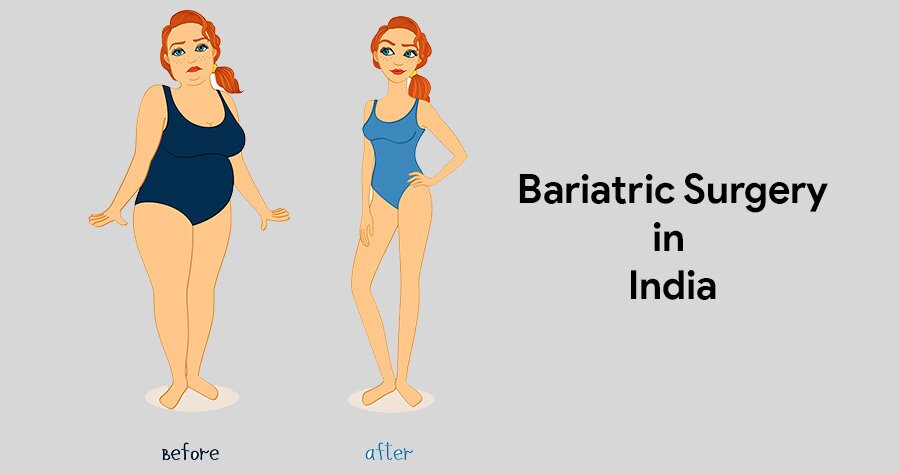Bariatric Surgery in India

Most of us know of or at least have seen excessively overweight persons and children too. It makes us wonder how do the obese people go about doing their regular activities and similar such questions. Being obese is a huge social stigma that such people have to live with. Apart from physical discomfort, being obese can be immensely detrimental to one’s self-confidence and thus the overall psyche.
A person can be obese due to his/her genetics. One can be obese owing to a sedentary lifestyle, consumption of high-calorie and sugary foods, aerated drinks, fast foods and lack of physical activity. In some cases, one may gain disproportionate weight due to underlying health issues such as hypothyroidism and Cushing’s syndrome. In medical terms, a person is obese if he/she has
A Body Mass Index ≥ 40, or more than 100 pounds overweight
A Body Mass Index ≥ 35 and accompanied by more than one or more obesity-related co-morbidities such as; (i) Type II diabetes (ii) Hypertension (iii) Sleep apnoea and other respiratory disorders (iv) Non-alcoholic fatty liver disease (v) Osteoarthritis (vi) Lipid abnormalities (vii) Gastrointestinal disorders and (viii) Heart disease.
Inability to achieve a healthy weight loss sustained for a period of time with prior weight loss efforts.
For such people then, a bariatric surgery is suggested. A bariatric surgery is performed to help patients lose excess weight surgically. Nowadays, such a surgery performed is a minimally-invasive procedure to limit the amount of food the stomach holds. The surgery alters or interrupts the digestion process so that food is not broken down and absorbed the usual way.
Bariatrics is a specialised branch of medicine that deals with the study, treatment and prevention of obesity. Some of the common bariatric surgery procedures are :
Gastric bypass
Sleeve Gastrectomy
Adjustable gastric band
Biliopancreatic Diversion with Duodenal Switch
The successful surgery of Ms Eman Ahmed from Egypt is a case in point. A laproscopic sleeve gastrectomy was performed on her at the Saifee Hospital, Mumbai. After the weight-loss treatment, she lost 324 kg. She weighed 176 kg when she left.
Advancements in Bariatric Surgery
Some of the advanced bariatric surgeries are:
Intragastric Balloon: In this procedure, a saline-filled silicone balloon is placed in the stomach. This limits food intake and helps one feel full faster.
New Drug Therapies: Drugs used to treat Type II diabetes are used to treat weight loss. These drugs work like the glucagon-like peptide-1 (GLP-1) hormone. The drug stimulates the increase of insulin while inhibiting the release of glucagon and thus decreasing the amount of food intake due to increased satiety.
The Apollo OverStitch Device for Endoscopic Sleeve Gastroplasty: This is a minimally-invasive procedure that allows physicians to place full thickness sutures through a flexible endoscope. The stitches reduce the size of the stomach. The patient adapts a healthier way of eating with reduced appetite.
Mini Gastric Bypass (MGB): A Mini Gastric Bypass is a less-invasive laparoscopic gastric bypass weight loss surgery that inhibits the absorption of food nutrients across the gastrointestinal tract.
Advancements in Bariatric Surgery
A bariatric surgery requires the patient to follow a strict diet before and after surgery. It is extremely important for the patient to get accustomed to the new diet from the time the treatment starts and even after surgery.
The pre-op diet helps improve the safety of the surgery and so that the surgery goes smoothly for the doctor and patient too. A pre-op diet is necessary to
Reduce excess fat in around the liver and abdomen
Keep the patient healthy post-op too
A few weeks prior to surgery, the patient is advised protein-rich and low-calorie foods. Protein-rich foods will help build and protect muscle tissue and help burn fat and not muscle, low-calorie foods are easy to digest. A protein-rich diet also aids faster recovery.
As you approach the surgery date, you may be asked to follow a mostly-liquid or liquid-only diet. Your doctor may even allow you to eat some solid food.
The post-op diet after a bariatric surgery is to be followed in a phase-wise manner, with
Phase I: Comprising of liquid foods only
Phase II: Comprising of soft and pureed foods in the first month after surgery
Phase III: Comprising of solid foods rich in protein
In 2017, it was reported that India was carrying out over 100 weight loss surgeries. As per a Lancet study, India ranked third in the world with a population of obese people. One in every 5th Indian is diagnosed with obesity and thus this procedure has generated and is gaining popularity . While most may opt for this surgery for weight-loss, some may opt for purely cosmetic reasons. Some others may opt for this surgery to reduce comorbidities such as diabetes, cardiovascular diseases, stroke and such other illnesses.
Cost of Bariatric Surgery in India
Given the world-class hospitals and skilled doctors in India, a bariatric surgery in India offers a 30%-70% reduction in cost as compared to that in US and UK. The surgery cost ranges between Rs 2.5 lakh to Rs 5 lakh . The following table gives an estimate of the likely outgo for a bariatric procedure.
| Bariatric Surgeries | Days in Hospital | Procedure Cost (USD) | Procedure Cost (INR) |
|---|---|---|---|
| Laparoscopic Gastric Banding Surgery | 3 | 8,200 | 4,92,000 |
| Laparoscopic Gastric Bypass | 4 | 7,800 | 4,68,000 |
| Gastric Bypass including stapling | 4 | 8,600 | 5,16,000 |
| Laparoscopic Sleeve Gastrectomy | 4 | 6,600 | 3,96,000 |
| Sleeve Gastrectomy including stapling | 4 | 6,600 | 3,96,000 |
| Roux-en-Y Surgery | Depends upon the treatment | 7,970 | 4,78,200 |
| Intra Gastric Ballooning | Depends upon the treatment | 2,750 | 1,65,000 |















